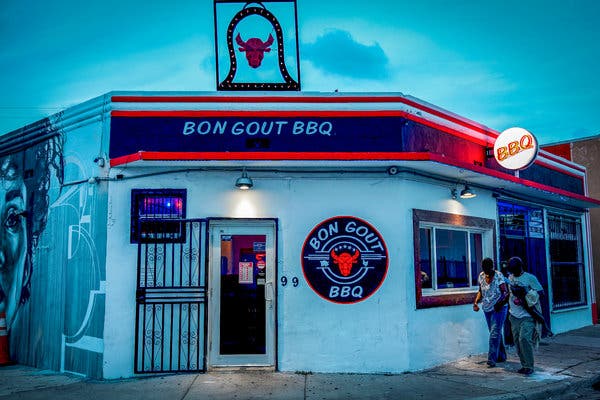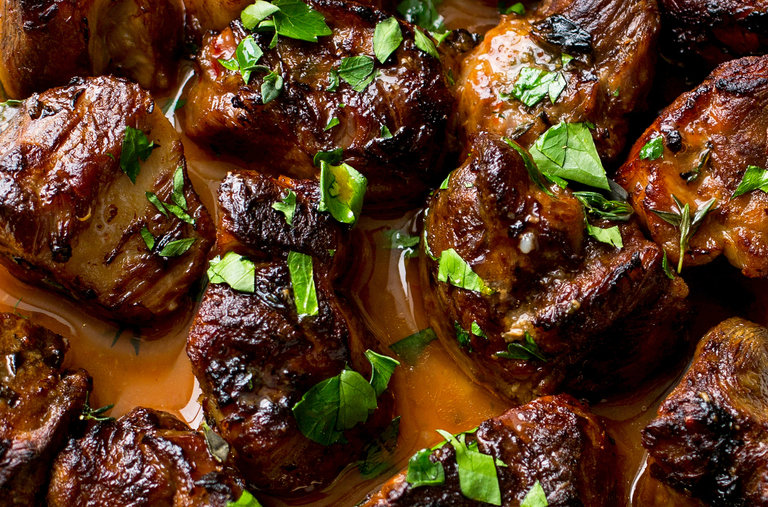MIAMI — Haitian restaurants bloomed here in the 1990s and 2000s as their reputations grew for serving ambrosial rice and bean platters at cheap prices. On the weekends, barbecue smoke perfumed street corners and backyards as lines of customers formed.
Many of their owners and customers had come to South Florida in the previous three decades to escape the oppressive governments of the Haitian presidents François Duvalier and his son, Jean-Claude Duvalier.
But in the United States, they continued to encounter social oppression and everyday slurs. Cat-eaters: That’s how some people referred to Haitians while I was growing up in North Miami in the 1980s and ’90s.

CreditAngel Valentin for The New York Times
Jean (B.J.) Lucel, an owner of Bon Gout BBQ in Little Haiti, was 5 when he emigrated from Port-au-Prince in 1986. “There were Haitian ‘jump days,’ when certain schools would jump Haitians. People were running and fighting,” said Mr. Lucel, 37.
Zoe Pound, a Haitian gang — Zoe derives from zo, the Haitian Creole word for bone — is said to have emerged in the ‘90s as a reaction to those attacks. (Some Haitian-Americans refer to one another as Zoe, even if they’re not affiliated with the gang.)
Eventually, some of the people ridiculing Haitians became customers at the local restaurants. “You may not like Haitians,” said Mr. Lucel, “but you can’t deny our food.”
He collaborated with Wesley Bissaint and Edward Rawson, fellow owners, and opened Bon Gout in December in a small storefront. It serves Haitian-American barbecue that combines Haitian cooking traditions with black culinary influences from the South.
Inspired by dishes he had made while living with Mexican friends in East Los Angeles, Mr. Rawson created a riff on tacos: Zakos — taking the Z from Zoe Pound — are soft corn tortillas stuffed with queso fresco and coarsely chopped pork griot (fried pork), then topped with fresh cilantro and served with pikliz, a pickled slaw.
They are a carnival of hot and cool, sweetness and spice, mixed with crunchy, fatty pork goodness. The restaurant offers an array of sauces, including Men Pa’W Gourmet Hot Ketchup, a Haitian hot sauce made locally with Scotch bonnet peppers and curry powder.
In March 2016, Mr. Lucel and Mr. Bissaint, 39, (who are high-school friends) started grilling chicken and ribs at local festivals near Mr. Lucel’s 1804 Ink tattoo shop.
I followed their smoke. So did Mr. Rawson, 39, an artist and entrepreneur who created the tattoo shop’s mural. Originally from Pittsburgh, he spent much of his childhood in Deschapelles, Haiti, where he enjoyed pig roasts with his grandparents.
Mr. Lucel arrives at Bon Gout between 4:30 and 6 a.m. to begin the eight- to 10-hour process of smoking brisket.
At 7 a.m., the neighborhood is a Port-au-Prince morning poem. Roosters stagger from yards like old men. Cats sprawl out. Ribbon-crowned girls in school uniforms stand outside homes painted in the colors of guava, mint, papaya and star apple.
Mr. Lucel first puts ribs and chicken on the grill, then sometimes picks up Mr. Bissaint’s mother, the chef Miselie Marseille, whom the owners call Mama Chef. Ms. Marseille is from Port-de-Paix, grew up in the restaurant business and moved to South Florida in 1979; she opened two restaurants, one in Miami, the other in Fort Lauderdale. At Bon Gout, she is in charge of the barbecue.
“In Haiti, you have to clean the meat first,” Ms. Marseille said — that is, marinate it in an acidic liquid. The ribs, for example, marinate in sour orange, salt and water for up to an hour. After she drains the marinade, she adds a spice blend: salt, garlic, green onion, parsley, paprika and soy sauce.
The Haitian cookbook author Cynthia Verna explained that Haitians add sour orange, lime or vinegar (or all three) to brine and tenderize meat. Ms. Verna is among a group of cooks and historians who believe that barbecue started in Haiti. Barbecue and the Haitian word boukannen are derivatives of barabicu (sometimes translated as “the sacred firepit”), a term the Taíno people of Hispaniola used to describe cooking over a flame.
The ribs and brisket here are tender, lip-glossing and best enjoyed mixed with banan peze (fried green plantain), the rice of the day, Haitian macaroni and cheese, cornbread and collard greens. Wash this down with flop, a super-sweet, vanilla-spiced iced tea-lemonade.
Bon Gout’s kitchen is much like a Caribbean market, with Haitian women chopping green plantain and lime, talking and laughing. The restaurant attracts a mélange of corporate and bohemian types, local cops, neighbors and travelers from afar, with dialects as diverse as skin tones.
Pride runs deep in this culture set between two red, white and blue flags, even as Haitian-Americans feel their dignity is repeatedly challenged. President Trump, for one, last year used a vulgar epithet to describe Haiti and some African nations.
Is there healing in the sacred barbecue pit? As Mr. Lucel talked hopefully about Miami’s cultural unity, and how far Miami has come from those Haitian jump days, I pondered the Zoe references throughout the menu.
“If you ain’t got no scars,” Mr. Lucel said, “you ain’t barbecuing.”
Bon Gout BBQ, 99 NW 54th Street (NW First Avenue), 305-381-5464, bongoutbbq.com
Recipes: Pork Griot | Pikliz






